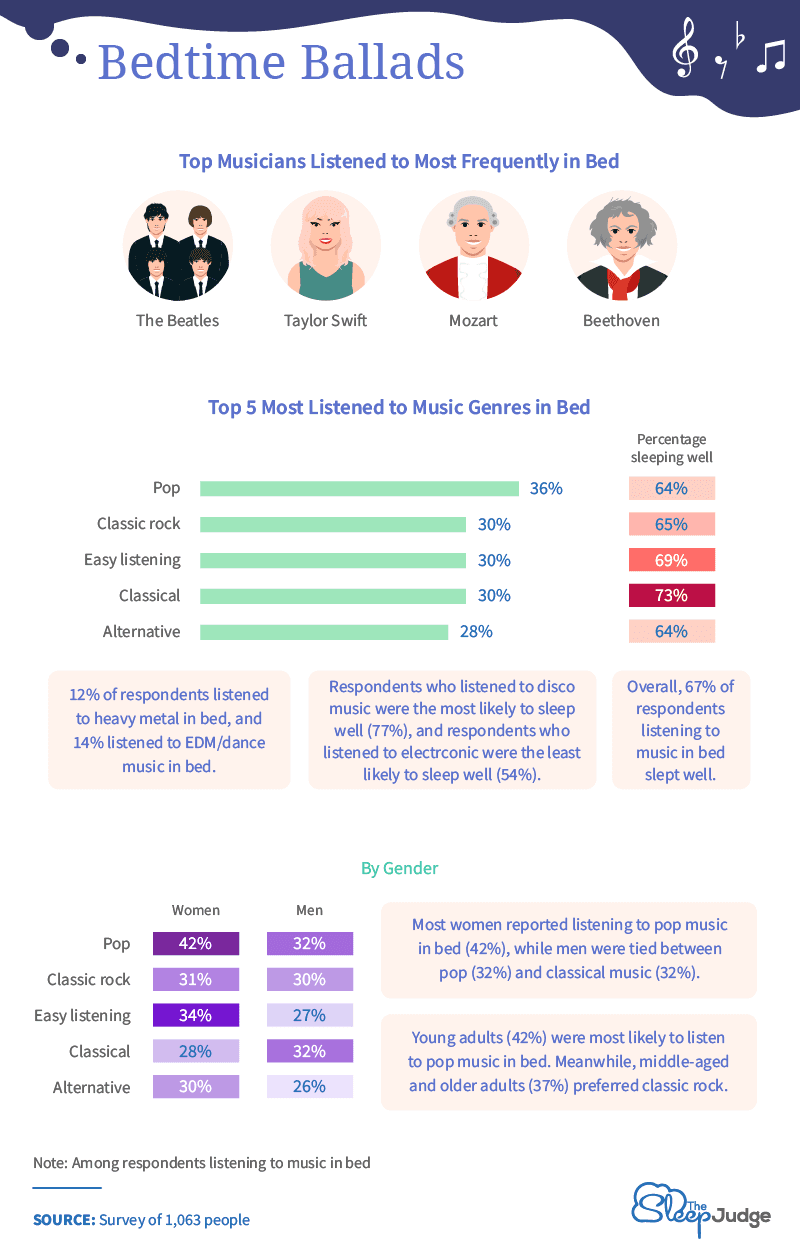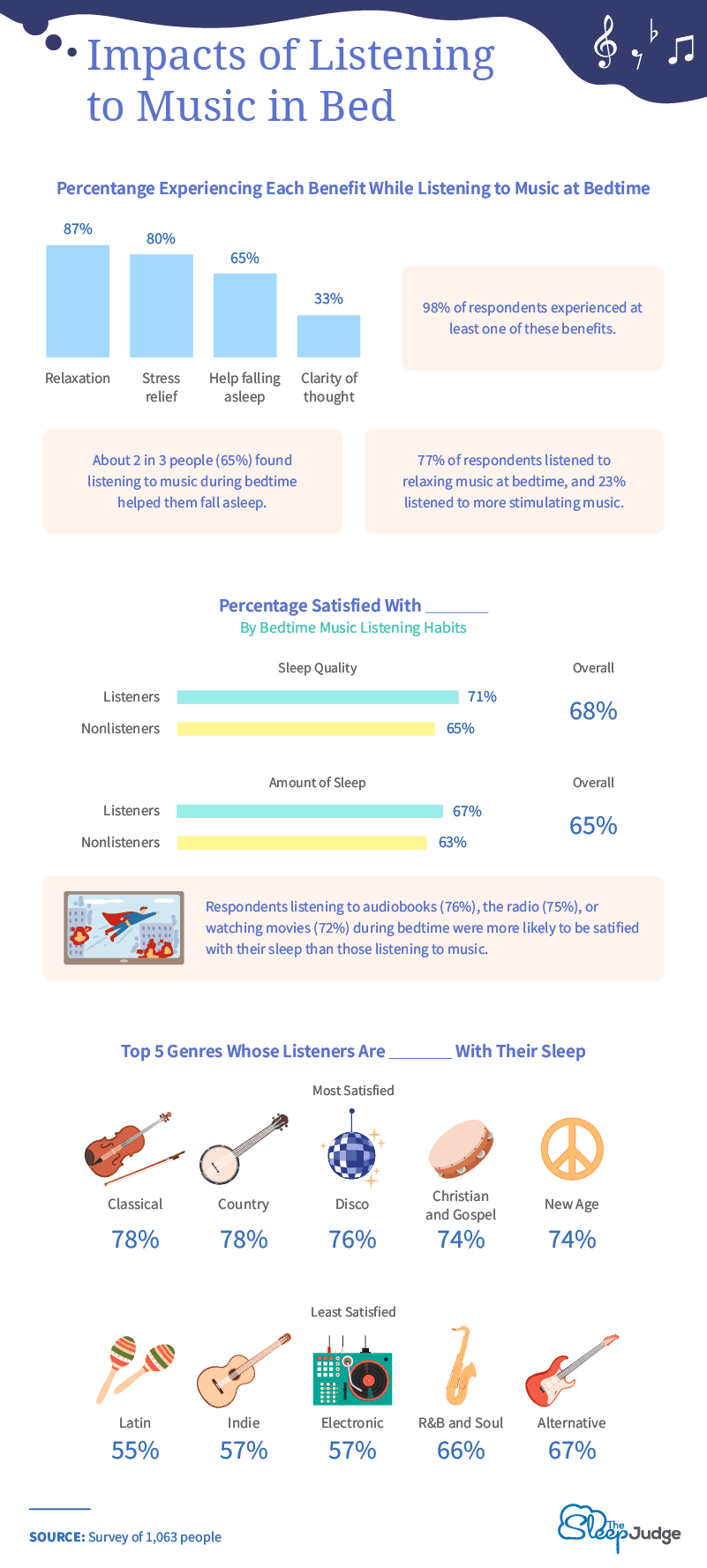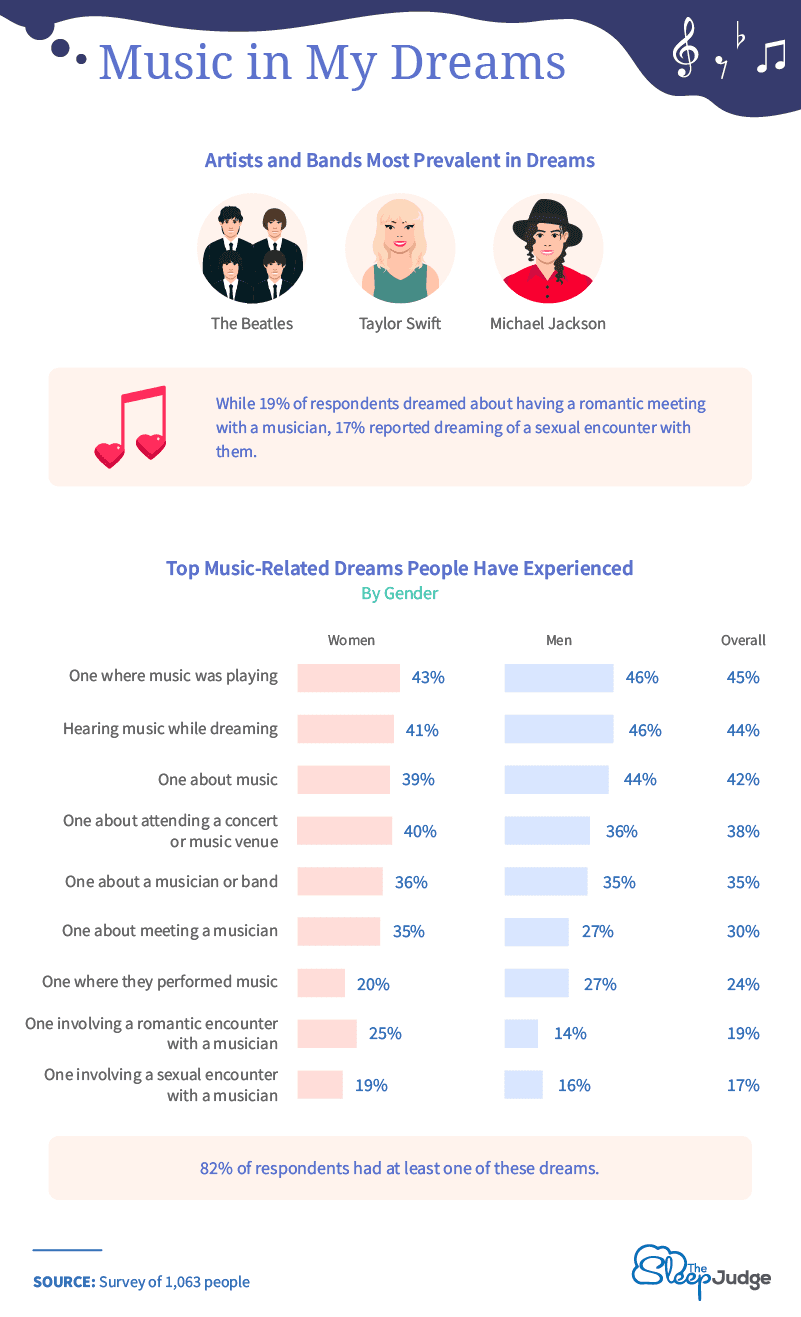With the earliest known musical instrument dating back 400,000 years, the music we know today has come a long way. From the early classical greats to top-charting rap artists of the 21st century, music’s benefits across all genres can’t be denied. Connecting people, increasing motivation to learn, improving memory, treating mental illness, and even helping hearts – all from a simple melody.
Between hundreds of benefits and just pure enjoyment, it’s no wonder babies and adults often rely on music to improve their sleep. But even if music isn’t playing while people drift off, love for songs and melodies during waking hours often carries over to dreams. So, how common is music in the bedroom, and how does its presence impact sleep habits and dreams? To find out, we surveyed over 1,000 people about their musical habits in the bedroom and their subsequent nightly experiences. Keep reading to see what we uncovered.
Musical Benefits for Bedtime
In 2019, the majority of Americans across every generation listened to music daily. As the country went into lockdown and caused boredom, mental health issues, and insomnia to soar, the COVID-19 pandemic also caused a spike in music listening. According to our study, 46% of respondents listened to music at bedtime, beating the number of people watching movies (40%), listening to podcasts (27%), and listening to audiobooks (14%).
Those who listened to music at bedtime did so for an average of five nights per week and mainly to help relaxation (70%). Both men and women shared the top reasons for listening to music at bedtime, and reducing stress (64%), aiding sleep (56%), and entertainment (46%) followed relaxation. On top of sleep-related reasons to listen to music at bedtime, 70% of young adults and 69% of middle-aged and older adults also brought music into the bedroom while having sex. While less prevalent, 39% of people had also listened to music while masturbating, with young adults more likely to do so than their older counterparts.
Is Genre Key to Quality Sleep?
Everyone has different musical tastes, but listening to rock music before bed may not be the best idea. In fact, studies have shown that music with a rhythm of about 60 beats per minute helps people fall asleep more than any other tune. In line with prior studies, our respondents reported listening to Mozart and Beethoven the most, along with The Beatles and Taylor Swift.
However, despite classical greats among the top listened-to musicians, pop music was the genre of choice for our respondents, followed by a tie between classic rock, easy listening, and classical. Perhaps unsurprisingly, the genre people listened to strongly correlated with their sleep quality: Compared to 64% of pop music listeners, 73% of those who listened to classical music reported sleeping well. Interestingly, the music listeners who were more likely to report high-quality sleep listened to a genre that didn’t make the top five: Disco.
Across all genre types, men’s and women’s listening styles were generally in line with one another. The most considerable difference occurred between the genders in listening to pop music: Compared to 32% of men, 42% of women listened to pop music in bed.
Satisfied With Sleep
It’s clear specific genres are more beneficial for sleep than others, but let’s dive into the overall benefits. According to our study, relaxation was the most common benefit of listening to music at bedtime. While 87% felt relaxed while listening to music in bed, 80% also felt less stressed, 65% said it helped them fall asleep, and 33% gained clarity of thought.
Those who chose to listen to music in bed were also more satisfied with their sleep quality and amount of sleep. Compared to 65% of nonlisteners, 71% of listeners said they were satisfied with their sleep quality. Along the same lines, 63% of nonlisteners were satisfied with their amount of sleep, while 67% of listeners said the same.
While music listeners were more satisfied with sleep than nonlisteners, they weren’t the most satisfied overall: Respondents listening to audiobooks (76%) or the radio (75%) and watching movies (72%) during bedtime were more likely to be satisfied with their sleep than those listening to music. Like music genres, picking audiobooks, radio shows, and movies deemed relaxing is known to help sleep, while exciting or new content can keep your brain active late into the night.
Dreaming of Melodies
The purpose behind dreams still remains a mystery, but research points to dreams acting as a means of restoring memories. That being said, it would make sense if people who make music a large part of their life also hear music in their dreams. In line with top artists listened to at bedtime, respondents reported hearing The Beatles and Taylor Swift in their dreams the most. Also among these top artists was Michael Jackson.
But respondents didn’t always stop at listening to artists in dreams: 19% of respondents dreamed about having a romantic meeting with a musician, and 17% reported dreaming of having a sexual encounter with them. Women were more likely than men to report both types of dream encounters, but men were more likely to report having a dream where music was playing, hearing music while dreaming, and dreams about music in general. Men were also significantly more likely than women to report having a dream where they performed music.
Mixing Music and Mattresses
Music has been a part of life for eons, with various cultures reporting the connection between music and dreams. From setting the mood for quality sleep to setting the mood for sex, music in the bedroom can have plenty of benefits and uses. However, depending on the goal, the type of music listeners should play varies: Classical music (or potentially disco music) was reported as most beneficial for quality and amount of sleep and satisfaction with each.
But bringing music into the bedroom can be just one way to improve the quality and quantity of sleep. Whether you’re struggling with insomnia, a sore back, or even bad dreams, pairing music with a new mattress, mattress topper, or pillow may be the change your sleep habits need. At The Sleep Judge, our experts create reviews from experience so you can rest assured you’re buying the best product for your needs. To make sure you’re getting the most bang for your buck, visit us online today.
Methodology and Limitations
We surveyed 1,063 people about their experiences having music-related dreams. Fifty-five percent of respondents were men, and 45% were women. Respondents ranged in age from 22 to 61 with an average age of 36.
For short, open-ended questions, outliers were removed. To help ensure that all respondents took our survey seriously, they were required to identify and correctly answer an attention-check question.
Data are based on self-response and carry the inherent issues present with such, including telescoping, recency bias, and exaggeration.
Fair Use Statement
Everyone is after a better night’s sleep, even if that means a bedding makeover. If you know someone who would benefit from our study’s findings, feel free to share it with them for noncommercial purposes. All we ask is that you include a link back to this page to give our contributors proper credit.



